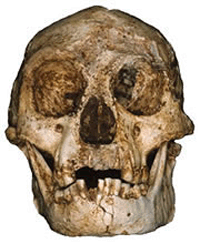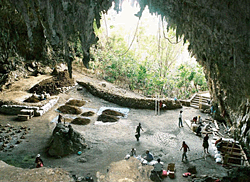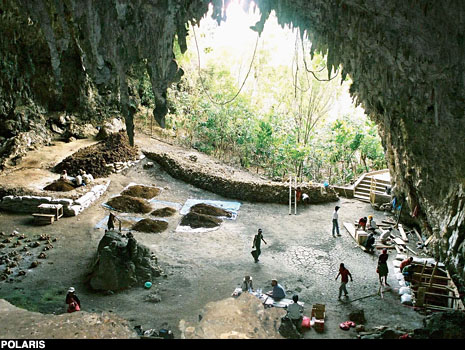
Posted on 10/29/2004 2:11:55 PM PDT by blam
Indonesia's Lost World: Shaking Up the Family Tree
October 28, 2004
by David Keys

Homo floresiensis skull (© Peter Brown)
New archaeological discoveries by Australian and Indonesian scientists on the Indonesian island of Flores are revealing that until at least 13,000 to 12,000 years ago, modern humans--our species, Homo sapiens--shared this planet with a totally different species of human being--a three-foot-high dwarf hominid with physical features usually seen as dating from 1.5 to 4 million years ago.
The scientists, mainly from Australia's University of New England and University of Wollongong, have found the skeletal remains of up to seven individuals in a cave at Liang Bua, Flores. Their diminutive stature, small brain size (380 cc), receding chin, the shape of their first mandibular premolar tooth and the skull base design in the ear region are all reminiscent of early Australopithecus, a type of hominid which was thought to have existed only in Africa prior to 3 million years ago.
On the other hand the thickened cranial vault, the relatively flat face, and the smaller molar teeth of what is being called Homo floresiensis are all more reminiscent of Homo erectus, which flourished between 1.8 million and possibly 300,000 years ago.
The newly discovered Flores skeletal material, published this week in the scientific journal Nature, may be from a species which either broke away from our distant ancestor Australopithecus some 3 million years ago or more likely a species derived from a very early form of a later ancestor of ours, Homo erectus.
"The skeletal material we have found has come as a big surprise because hominids of that body size and brain size were supposed to have become extinct 3 million years ago," says excavation member Peter Brown, a physical anthropologist from the University of New England.
It is quite possible that the Homo floresiensis' tiny size--and correspondingly small brain--is a result of being stranded on a small island for tens or hundreds of thousands of years. Because species on small islands are shielded from predators living on mainland areas, large size often becomes redundant as an defensive advantage, and they "shrink" evolutionarily over time.
The archaeological evidence strongly suggests that Homo floresiensis made sophisticated stone tools, including choppers, cutting blades, scrapers, and even spear points, some of which appear to have been hafted onto lengths of wood. These tools are very similar to those made by ordinary Stone Age humans (especially in Europe and North America), and yet the Flores hominid had a brain capacity similar--in terms of ratio to body size--to that of early humans like the Australopithecines and Homo habilis, who made only very rudimentary stone tools. The only other explanation for the presence of such sophisticated stone tools, which were found together with the skeletal material, is that they were produced by Stone Age Homo sapiens--but the earliest of the Flores tools date from 90,000 years ago and Homo sapiens is not currently thought to have arrived in Southeast Asia until 50,000 to 60,000 years ago.

The cave at Liang Bua, Flores, where the discovery was made (POLARIS)
"All the evidence so far indicates that the stone artifacts prior to 12,000 years ago at Liang Bua were all made by Homo floresiensis" says Mike Morwood, an archaeologist from the University of New England, who has been leading the investigations on Flores.
What's more, folklore evidence, which has been gathered by the researchers on the same island, provides the remarkable suggestion that Homo floresiensis may have survived until at least 150 years ago. And zoological evidence from another Indonesian island, Sumatra, suggests that a potentially similar intelligent bipedal species may still be alive and well and living in a remote jungle area.
The local tradition for Homo floresiensis is potentially significant. Villagers in Flores say that up until around 150 years ago, there were small, three-foot-tall hairy "people" who used to steal food from them. Known as the ebu gogos (literally "the grandmothers who eat anything"), they were tolerated by islanders until they stole a baby and ate it. Whether the ebu gogo is pure myth or an accurate recollection of Homo floresiensis is at present unprovable. "The folklore material raises the real possibility that Homo floresiensis actually survived until sometime in the nineteenth century," said excavation member Bert Roberts, a geochronologist at the University of Wollongong who conducted interviews with the villagers earlier this month. "Indeed, there has to be a remote possibility that they still survive today in some remote jungle area of the island."
On Flores, there have been no sightings of such creatures--at least, potentially, since the nineteenth century. However, in the same island chain, on the much larger island of Sumatra to the west, there have in recent years been brief, as yet unpublished sightings by a primatologist and others of a small, hairy four-foot-tall ape-like creature known to local tribesmen as orang pendek--literally "little person." Some zoologists suspect that a few hundred of them survive in the remote jungles of the Sumatran interior, but none have yet been captured or examined by scientists.
The new discoveries are likely to be greeted with immense excitement by the international scientific community.
"We now have to entertain the possibility that somewhere within the islands of southeast Asia, early types of human being--long thought to have been extinct--may indeed still survive," says Robert Kruszynski, a leading anthropologist at the Natural History Museum in London.
David Keys is ARCHAEOLOGY's London correspondent.


BTTT
Who would the "little people" endorse?
Remember Bilk Linton's cabinet?
FYI
Now days you can find them holding a can of beer and picking a fight with anyone taller.
Not necessarily, although making a crude raft out of logs isn't probably beyond hominids capable of making spear points and hunting in coordinated groups.
But even without boats, consider that the "Flores Men" were supposed to have come to the island about 85,000 years ago. At that time, the northern hemisphere (and presumably the southernmost regions of the southern hemisphere) were in the midst of an Ice Age. This means the ocean levels were lower than today, and it may be that the Indonesian archipelago was actually in many places a contiguous land mass, or at least consisting of islands much closer together (perhaps separated by swamps or mangrove forests rather than ocean.)
 |
 |
No problem. It's a big enough topic for more than one thread. Now, everyone in this thread will have access to the earlier ones.
Very cool.
Anything of interest to the evolution debates is marked with the keyword CREVOLIST. I had already tagged the three earlier ones, and this one is also tagged with that word.
An area the size of present day India, around Indonesia went under water at the end of the Ice Age...It is named Sundaland.
An excellent book on the subject is: Eden In The East: Drowned Continent Of Southeast Asia, by Dr Steven Oppenheimer

Disclaimer: Opinions posted on Free Republic are those of the individual posters and do not necessarily represent the opinion of Free Republic or its management. All materials posted herein are protected by copyright law and the exemption for fair use of copyrighted works.